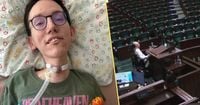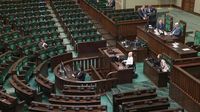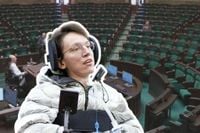On May 8, 2025, Łukasz Krasoń, the government commissioner for disabled persons, presented a draft law on personal assistance in the Polish Sejm. However, the event was met with disappointment as only a handful of MPs were present, leading to a wave of criticism from advocates for the disabled community.
Wojtek Sawicki, known for his social media presence on the profile "Life on Wheelz," expressed his outrage over the empty Sejm hall. He took to Instagram to share his feelings, stating, "I felt humiliated. Treated like trash, a citizen of the last category. Those empty seats are a symbol of how Poland treats people with disabilities. Shame!" His emotional response highlighted the broader frustrations of the disabled community regarding political indifference.
Just the day before, on May 7, two draft laws concerning assistance services for disabled individuals were discussed during a meeting of the Standing Subcommittee on People with Disabilities. Sawicki had attended this meeting and initially felt hopeful, as he heard encouraging words and plans regarding the assistance project. However, the stark contrast of the nearly empty chamber during Krasoń's presentation shattered that hope.
"The emptiness in the Sejm has taken away all my hope," Sawicki lamented. He pointed out that politicians from all factions seem to disregard the needs of people with disabilities. "We might remain in care facilities or with our ailing parents in inaccessible apartments, living below the minimum subsistence level. We have to go into debt or crowdsource money for exorbitantly costly surgeries and therapies abroad. No one even lifts a finger, unless they can take a photo with us. I know this best because I have many pictures with politicians. I am furious and deeply disappointed," he added.
The draft laws being discussed reveal significant differences in approach. The presidential proposal states that assistance services will be available to adults without an upper age limit, while the governmental draft limits eligibility to individuals aged 13 to 65. Additionally, the presidential draft suggests offering employment contracts to personal assistants, whereas the governmental version proposes civil law contracts, which include rights to leave and sick insurance.
In response to the empty hall during the presentation, Krasoń remained resolute, insisting that he would continue advocating for the law. "There is no obstacle that will stop me on this path—even if I have to speak (because I cannot shout) to an empty hall, I will achieve the goal I set from the beginning: a good, wise, and fair law on assistance is in everyone's interest, even those who do not want to hear about it," he stated on social media.
The lack of attendance during such a critical discussion has sparked outrage not only from Sawicki but from many within the disabled community. Activists are planning a protest on May 13 at 12:00 PM in front of the Chancellery of the Prime Minister, aiming to draw attention to the ongoing neglect of their needs.
Malwina Łapińska, another prominent voice in the community, criticized the political landscape, stating, "This is not the first or last time the community of people with disabilities is used to change poll numbers. You don't even pretend otherwise. Shame!"
The Ministry of Finance has also raised concerns regarding the financial implications of the proposed assistance law. They estimate that the implementation of such services would lead to an increase in public sector expenditures by approximately 66.3 billion złoty from 2025 to 2035. Furthermore, the Ministry pointed out that there are no allocated funds in the 2025 budget to support the law's implementation.
As the debate continues, many in the disabled community remain skeptical about the political will to enact meaningful change. Sawicki's poignant remarks resonate deeply, reflecting a widespread sentiment that the needs of disabled individuals are often overlooked in political discourse. The empty hall stands as a stark reminder of the challenges faced by advocates fighting for essential services and recognition.
With the future of the personal assistance law still uncertain, the community's advocates are determined to keep pushing for their rights. The upcoming protest is expected to draw significant attention, as activists demand accountability and action from their elected representatives.
As the situation unfolds, the voices of those affected by disabilities are becoming louder and more insistent, calling for the recognition and respect they deserve. Whether the government will heed these calls remains to be seen, but the empty seats in the Sejm have sparked a movement that cannot be ignored.



